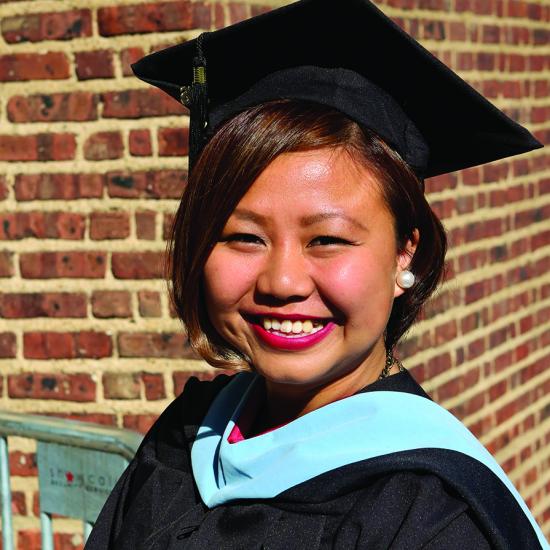Youth Leadership Initiative Alumna Draws on Leadership Lessons in School and Life
Graduates of Wilder’s Youth Leadership Initiative (YLI) are more likely to go to college and more likely to volunteer in their communities, according to a recent evaluation by Wilder Research.
And among high-achieving, civic-minded Youth Leadership Initiative students, Kia Lor stands out. Kia, 25, was the first of several YLI alumni to earn a Gates Millennium Scholarship, a competitive, full-ride scholarship for students of color who demonstrate excellence in academics, stewardship, and leadership. This year, Kia became the first known YLI alum to earn a master’s degree. She received her Master of Science in Education at the University of Pennsylvania Graduate School of Education, where she focused her research on Intercultural Communication.
Now, Kia is ready to launch a career at the intersection of multiculturalism and education, a calling that in many ways she has been preparing for her entire life. Kia is a first-generation Hmong American who moved to Minnesota at age four. She grew up balancing the cultural expectations of her Hmong family with mainstream American culture in the United States.
Managing these demands was challenging, but through activities such as YLI, Kia learned to embrace her multicultural identity and gained skills in intercultural communication. “YLI was structured in a way that helped me understand my circumstances,” Kia says. “I was able to meet all sorts of people who had the same problems, but they weren’t Hmong. They were Karen, they were Latino, they were Filipino, and they shared the same cross-cultural conflict. Together, we started creating solutions.”
Not If Youth Want to Lead, But How
Youth Leadership Initiative is an intense year-long multicultural leadership program where youth learn skills, engage in community action, and develop as leaders. Through leadership retreats, cultural exploration sessions, and action teams, youth acquire self-awareness, build effective working relationships, and engage in meaningful action in their communities.
YLI staff and participants work together as colleagues rather than in a teacher-student or adult-child dynamic. Participants are encouraged to return to YLI after their initial year to mentor youth and work alongside staff to develop programming. Youth often participate in the program for several years.
“We don’t develop youth into leaders. They are already leaders,” says Nou Yang, Director of YLI. “YLI gives youth the space to understand not if, but how they want to lead. Youth have a chance to learn about themselves, about each other, and to take action on issues that are important to them.”
Through YLI and other leadership programs, Wilder helps build capacity and develop new generations of engaged and involved citizens. “YLI participants like Kia have a chance to learn skills that they can use throughout their lives to make our communities stronger,” says Kristine Martin, a previous vice president of Wilder Center for Communities.
A Legacy of Investing in Youth Leaders
Kia joined YLI during her senior year. She learned to advocate for herself and communicate with people in positions of power. She learned about the experiences of students from other cultures and backgrounds and strengthened her identity as Hmong American. “In retrospect, YLI sparked my passion for intercultural work,” Kia says.
After high school, Kia studied Communication at the College of Saint Benedict in St. Joseph, Minnesota, where funding from her Gates Scholarship allowed her to study in China and India in addition to her coursework at the college. Nou and other YLI staff kept in touch and offered support as Kia learned to navigate life as a Hmong American on a predominantly white campus. “Mentorship was the most important ingredient in my college success,” Kia says. “I remember meeting with Nou during my winter breaks and asking her how she dealt with issues of privilege and institutionalized racism. Her stories and wisdom strengthened me.”
By the time Kia began studying at the University of Pennsylvania, she felt confident in herself and her values. She also had practical skills; many of the activities and games that Kia learned in YLI were useful in her graduate work in intercultural education.
For Nou, Kia’s success shows what can happen when youth are given support and space to use their leadership skills. “This is what happens when we invest in young people—they run with it,” Nou says.
